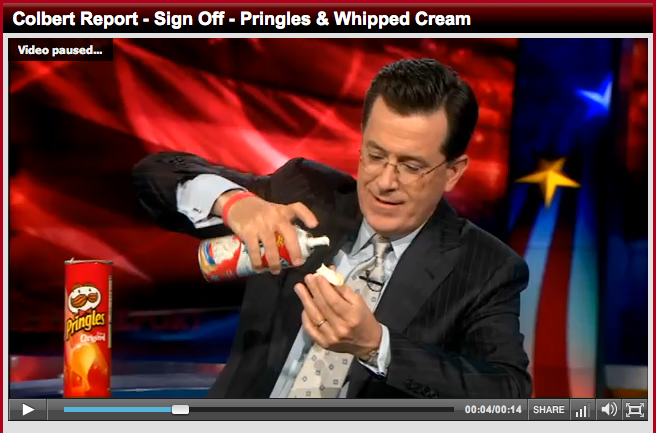
Image Credit: screen capture from ColbertNation.com
Food policy can be pretty disheartening stuff: anything that combines environmentalism, worker's rights and public health in a single topic is likely to include bad-to-terrible news pretty much every day. With the Senate underfunding the Child Nutrition Act, bluefin tuna set to go extinct and Dirt! The Movie preparing to air on PBS, even my fairly-high tolerance for crisis fatigue was wearing thin this week. Thankfully, Stephen Colbert was there to talk me off the ledge. As is often the case, Colbert managed to make life livable with his pringle-and-whipped-cream-like blend of irony and humor-- two remarkable human capacities that are often undervalued because they elude satisfactory explanation by rhetorical, literary or philosophical models. While even Jon Stewart's comedic analysis of politicians and pundits can often be as depressing as it is amusing, Colbert's satiric send-ups consistently manage to wink their way through all kinds of maddening news stories and leave me with a crisp, clean finish. His new "Thought for Food" segment lives up to those expectations. Rather than attempting (and almost certainly failing) to explain the jokes, I thought I'd share a few videos and comment as needed. More on Colbert, corn-surpluses, advertising and unholy sandwiches after the break.
Colbert began his "Thought for Food" segment in mid-March. His second installment covers a lot of the ground that I have written about recently on this blog. He begins, appropriately enough, with some novel uses for corn-- when subsidies artificially supress the price of corn while simultaneously creating massive surplusses, you get... well, you'll see. He ends with his own take on Oliver's Food Revolution.
The third and latest installment of "Thought for Food" focuses on marketing processed foods. The centerpiece of the segment takes aim at KFC's new "Double Down" "sandwich". If you thought Colbert's Pringle-RediWhip creation was a bad idea, then you'll love this bacon sandwich with fried-chicken buns. Oddly enough, the fist time I logged on to ColberNation.com and watched the video of Stephen roundly panning the fried mass of animal protein, the banner ad at the top of the page was selling-- wait for it-- KFC's new Double Down sandwich (I guess that when your food is a publicity stunt, any attention is good attention). It reminds me of Michael Pollan's "rule" about not eating anything you've ever seen advertised.
One important effect of satire like the Colbert Report comes from creating a space in which we can release the engery, frustration, angst, etc. that are stirred up by serious social problems. They can be refreshing without being escapist. As Kierkegaard puts it in his "Concept of Irony," works like this can disarm us, and being taken off-guard can be a valuable experience for people locked in an entrenched debate. Humor can give us critical distance from even deeply held values (an effect Bakhtin notes when writing about parody and the sacreligious), and even when it doesn't bridge differences and open new lines of dialogue, that temporary distance lets us catch our breath and rest our passions. Ok, that's all the speculation I have in me today. I'll leave you with a video of Colbert interviewing Jonathan Safran Foer in which Stephen gives the world's greatest description of free range chicken eggs.
Recent comments
2 years 29 weeks ago
2 years 44 weeks ago
2 years 44 weeks ago
2 years 50 weeks ago
3 years 4 weeks ago
3 years 4 weeks ago
3 years 4 weeks ago
3 years 6 weeks ago
3 years 6 weeks ago
3 years 6 weeks ago